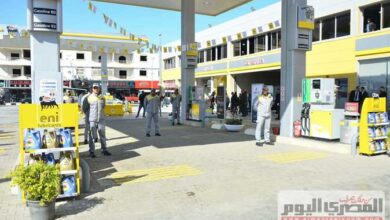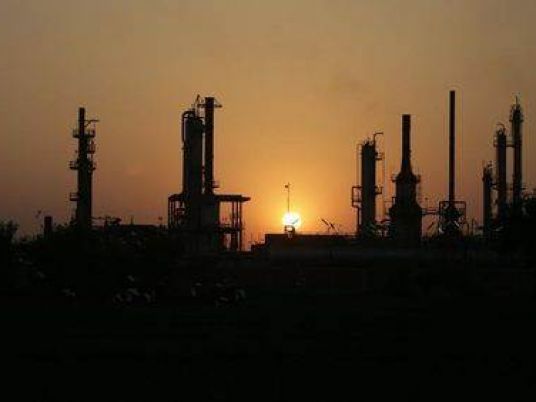Diesel shortages have become an unfortunate staple of Egypt’s many economic malaises, and as the country’s foreign reserves continue decreasing, so does the government’s ability to import its vital petroleum needs.
The impact of the shortage across a range of sectors will not ease up any time soon; instead, it will likely be felt more acutely and more broadly, extending to the average consumers, who will predictably grapple with more power outages as summer approaches.
For months, experts have raised red flags as the government burned through foreign reserves to prop the falling Egyptian currency, saying this compromises the country’s critical import cover. Now, those reserves have fallen to a fresh low of US$13.5 billion, according to Central Bank of Egypt figures.
Hossam Arafat, head of the petroleum products division at the Federation of Egypt Chambers of Commerce, says Egypt does not have the foreign currency to sustain its importation of petroleum products, including diesel, which accounts for about 60 percent of its consumption.
The country lacks the necessary liquidity to pay for diesel imports, he says, and with the recent credit rating downgrades, most suppliers are now demanding advance payment. Arafat has little hope that what he described as the weak government will solve the diesel crisis, particularly under the current turbulence in its security apparatuses, as well as increasing political tension.
“Clearly, the government doesn’t have a plan. To end the diesel shortage, the government needs to provide about $1.5 billion to import fuel until the end of this fiscal year [30 June],” he adds.
The shortage has lasted for more than 80 days, he explains.
The lagging diesel supply has had an impact on many sectors, and the biggest concern right now is how it will affect the country’s electricity production as the consumption-heavy summer months roll in.
“If the diesel crisis continues, it will get worse every day. It will extend to affect essential parts of our lives, such as different commodity prices. Fruits and vegetables prices are already rising, as trucks and [tractor-trailers] can’t find the fuel needed to move goods across the country. If drivers or land shipping companies resort to the black market, they will push fuel to higher prices, in turn, inevitably increasing transportation costs,” says Arafat.
Last week, the Federation of Egypt Chambers of Commerce warned against the effects of the diesel crisis and how it would lead to a direct rise in commodities prices, adding that fruits and vegetables will become scarce on the market due to an accompanying sharp rise in shipping and transportation costs.
Petroleum expert Ibrahim Zahran concurs, adding that “it will have an effect on the regularity of imports and exports as transportation to and from ports will be disrupted as a result.”
“Factories in need of imported raw materials will face an increase in transportation costs, [as they move goods] from ports and to the markets,” he adds.
Moreover, Arafat says, the lack of diesel also impacts farmers as they are prepare for harvest time. Farmers are hesitant, since the upcoming wheat-harvesting season requires the use of tractors, plows and other machinery that runs on diesel, consequently raising fuel demands.
Harvest time begins in April and ends in June, he adds, and the “ministers of agriculture and irrigation pledged to provide the country with 120 million liters of diesel in the next couple of months.”
Beyond transportation, diesel fuel is also used in the operation of mobile towers.
Along with moving vital goods, diesel is also used in school buses, creating a problem for parents in rural governorates whose children’s schools are far away from the smaller villages. Several reports have come out in the past weeks about students missing classes due to a shortage of buses — this as final exam time approaches, affecting 18 million students around the country.
“Bakers as well are facing diesel shortage disaster, and having difficulty obtaining their share of fuel, and the government clearly doesn’t have a plan,” Zahran adds.
Bakers also protested last week in front of the Supply Ministry after news emerged of plans to remove flour subsidies, which will affect yet another vital commodity for Egyptian citizens.
Power ramifications
Maybe the biggest fear for citizens at large is the supply of electricity, with power plants highly dependent on diesel fuel to run. Last summer was punctuated by frequent power outages, and already this year, several power cuts have been reported in the past three weeks even though it’s not yet hot enough for citizen’s heavy consumption of electricity through usage of air conditioners.
Last week, Petroleum Minister Osama Kamal met with the electricity minister to discuss alternatives for operating power plants with the offered fuel. He had previously threatened to cut off fuel from the Electricity Ministry if it does not pay its LE50 billion debt.
Kamal and Electricity Minister Ahmed Imam agreed to form a joint technical committee of experts from the two ministries to follow the daily operation of electricity and natural gas networks, with the help of specialists from the electricity control center.
“We all have experienced what happened when pressure on electricity facilities increased last summer,” Zahran says, predicting an even worse experience this coming summer. “The fuel shortage leads to the weak performance of power plants, which produce 90 percent of Egypt’s electricity needs.”
To prepare for what some are expecting to be prolonged power outages, many have looked in to purchasing electricity generators, which ironically run on diesel as well.
The government recently increased the price of gas used in power stations from 18 piasters to 44 piasters per cubic meter, and raised the price of mazut from LE1,000 to LE1,800 per ton, as well as diesel from 55 piasters to LE1.50 per liter, Arafat clarifies.
Natural gas makes up nearly 80 percent of electrical energy stations’ consumption, with the remaining 20 percent split between mazut and diesel.
Diesel havoc
Although the Petroleum Ministry confirms that it has supplied the market with additional amounts of diesel and that the crisis is easing, a number of fuel station owners say the quantities they receive are not sufficient to cover market consumption. Driving around the capital, the crisis becomes tangible, as queues of microbuses, trucks and buses extend outside gas stations for hours.
In 6th of October City, gas station owner Mohamed Abdel Tawab says the daily quantities of diesel are not enough for the market. His station receives only 30 percent of what it used to receive before.
This varies from one station to another and according to its location in the Greater Cairo area, as well as from one governorate to another.
“The problem is that the government doesn’t have the dollars to import diesel because of the foreign currency reserve plunge,” Abdel Tawab says.
Diesel is heavily subsidized by the government, adding a strain on the already widening budget deficit. The government is trying to close the gap in the budget deficit by finalizing a long-delayed $4.8 billion loan agreement with the International Monetary Fund, which is expected to unlock a number of aid and funding pledges, as well as create a sense of confidence in investing in Egypt.
But until this comes through, problems persist.
The petroleum minister said last week that the crisis stemmed from smuggling large quantities of diesel to be sold on the black market.
At a petrol station in Maryoutia district of Cairo, the familiar scene of microbuses and trucks queuing up was present. One worker who spoke on condition of anonymity claims that the station does receive its share of diesel, but that the owners of the station sell it on the black market and pocket the profits.
He complains of the daily breakout of fights among drivers, in which workers get caught in the crossfire. He claims to have been previously beaten by microbus drivers along with his co-workers a number of times, and that the glass paneling at the gas station was smashed before.
Mohsen Tolba, who manages a gas station in Giza, blames the smuggling of diesel for the shortage, adding that they receive almost one-third of the quantity they used to receive daily, which is not enough to fill up all the vehicles that line up in front of the station.
“I now get 10,000 liters instead of 35,000. It’s not enough,” Tolba says.
Egypt imports 60 percent of its diesel consumption and diesel fuel subsidies accounted for about 47 percent of total energy subsidy in the 2012/13 budget, equaling around LE55 billion each year.
“Smuggling is only a small part of the problem,” Zahran tells Egypt Independent. “The amount sold at the black market remains ineffective. The government keeps saying that to avoid the blame.”
He adds that dismissing government officials, referring to recent dismissal of the head of the Egyptian General Petroleum Corporation, will not solve the problem, summing up the solution in three steps: importing sufficient amounts of diesel to cover market demands; importing raw petroleum to operate Egyptian oil refineries at full capacity; and finding an alternative to diesel and other power and fuel sources, such as natural gas or solar energy, and quickly adapting to these sources of energy.




